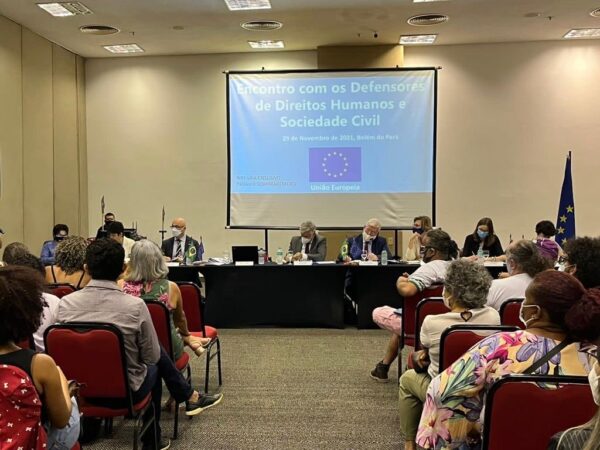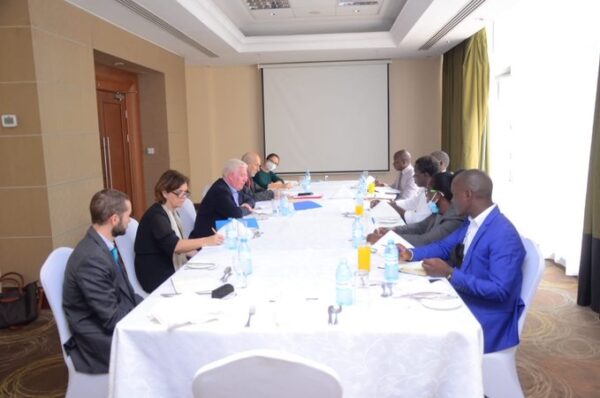HRC49 Side Event: The Human Rights Impact of Climate Change
49th regular session of the Human Rights Council (HRC49) side event:
‘The Human Rights impact of Climate Change:
An international and local challenge’
Remarks by EUSR for Human Rights, Eamon Gilmore
Monday 14 March 2022, 15.00-16.00 CET
CHECK AGAINST DELIVERY
Madam President,
It is a privilege to be speaking today alongside High Commissioner Michelle Bachelet and the Marshall Islands Climate Envoy Tina Stege, and I want to thank both the Office of the High Commissioner for Human Rights and the Marshall Islands for their cooperation in organising this event.
While here in Europe the situation in Ukraine will continue to be our primary focus over the course of the next few weeks and months, the climate crisis has not gone away.
Climate change and environmental degradation has and will continue to have an adverse impact on the full and effective enjoyment of human rights, such as the right to life, the right to health, the right to safe drinking water and sanitation, the right to food, to adequate housing and standard of living.
Those living in the most vulnerable situations will be hardest hit.
The European Union recognises this, and has made climate change a central element in its policies both internally and externally.
The European Green Deal, adopted in 2019, sets out a roadmap for a climate neutral continent by 2050. It identifies biodiversity conservation as an essential objective for sustainable development at the European and at the global level, and aims to protect the health and wellbeing of people from environmental related risks and impacts.
The EU Action Plan on Human Rights and Democracy 2020 – 2024, firmly establishes the EU’s commitment to supporting measures to address the high risks of environmental degradation, biodiversity loss and water scarcity on the exercise of human rights.

The EU Special Representative Eamon Gilmore heard from environmental human rights defenders in Para State during his mission to Brazil in November 2021.
A part of our commitment is to empower, support and protect those, including environmental human rights defenders and indigenous peoples, who work on the frontline to protect and conserve our land, air and waters.
Cities and local communities are on the frontline when dealing with the challenges posed by climate change.
The latest report by the Intergovernmental Panel on Climate Change emphasises the role of cities as places of increasing vulnerability but also highlights opportunities for climate adaptation and mitigation.
Over the course of the last decade, cities and local communities have taken the lead on local energy and climate actions, often being among the first to declare climate emergencies and sometimes setting more ambitious targets than their national governments.
Cities and local communities are not just partners, but pioneers, making the difference on the ground and inspiring us to do more. They have helped turn our policies and our objectives into clean buses and bicycle lanes. They install solar panels, they renovate buildings, they fight energy poverty and they adapt to climate change.
The EU has been supporting cities and local communities in their climate action for many years, predominantly through the application of EU funds.
In 2008, we created the EU Covenant of Mayors, which has been a reference point for local energy and climate action ever since.
It became a truly global initiative in 2016 when Bloomberg Philanthropies joined us to form what is today the Global Covenant of Mayors.
The Global Covenant is the world’s largest collective of cities and local communities committed to acting on climate change. It has been developed by cities, for cities, and provides a common framework for mayors to work on climate change.
It brings countless benefits to our local communities, improving air and water quality and making the city a better place to live for our citizens.
It is about jobs, green growth and social fairness.

The EU Special Representative Eamon Gilmore met with Ugandan environmental human rights defenders in Kampala, Uganda in April 2022.
Madam President,
I also wanted to make reference to the fact that today is the first day of the 66th session of the Commission on the Status of Women, whose priority theme is achieving gender equality and the empowerment of all women and girls in the context of climate change.
For the European Union, social justice, gender equality and the empowerment of women and youth are important prerequisites for environmental protection and for sustainable development at the local, national and international levels.
The 48th session of the Human Rights Council took some important steps in this regard, through the establishment of a UN Special Rapporteur on Climate Change and Human Rights, and through the adoption of a landmark resolution on the right to a clean, healthy and sustainable environment.
Through the efforts of this Council, the interdependence between the protection of human rights and the fight against climate change is becoming ever more widely recognised.
For example, just last month, EU Ministers of Foreign Affairs unanimously agreed a set of Council Conclusions on Climate Diplomacy, which placed unprecedented emphasis on the interrelationship between climate change and the realisation of human rights.
However, it is important that we now move forward, and concretely follow through on the commitments that we have made.
Today’s event with its focus on local communities is very important in this regard. The experiences of, and recommendations from our panellists, will help put a human face on the impacts of climate change, and encourage us to do more.
Thank you.